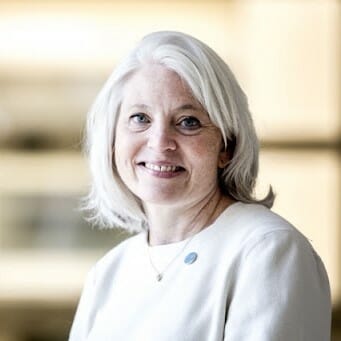
Jocelyn Brown Hall—Director of the Food and Agriculture Organization’s Liaison Office for North America—joined the ASU Food Policy and Sustainability Leadership Cohort for a wide-ranging discussion about advancing sustainable, resilient agriculture and food systems around the world to achieve food security. The Food and Agriculture Organization (FAO) of the United Nations celebrated its 75th anniversary last year with over 194 member states working in over 130 countries worldwide to end hunger through technical assistance, research, and policy guidance. At ease in the classroom, Ms. Brown Hall rapidly began connecting the work of the FAO and global food security challenges with the experiences and expertise of cohort members around the room, from conflict to climate change to indigenous cultivation practices.
Ms. Brown Hall reminded the group about the important standard setting bodies that FAO leads and cooperates with, including the Codex Alimentarius—establishing international food standards, guidelines, and codes of practice that contribute to food safety, quality, and fairness within international food trade; the World Organisation for Animal Health (OIE)—improving animal health worldwide; and the International Plant Protection Convention (IPPC)—protecting the world’s plant resources from the spread of pests and promoting safe trade. She also noted that with all of the work these bodies do to define standards and safe practices for our food system, the number of standards available are well below what we need. The lack of standards is complicated with differing agricultural and trade systems creating varied approaches for how governments regulate food system standards and public health.
The data released by FAO in their most recent The State of Food Security and Nutrition in the World, which describes the major challenges inhibiting the world from ending global hunger by 2030, paints a grimmer picture of the world’s progress to meet the needs of undernourished populations than many had hoped to be achieved by 2021. In response to this picture of the state of global food insecurity, from where Ms. Brown Hall sits, she sees the role of the FAO as the institution to increase awareness of ways to advance food security and address the confluence of challenges in the way, including conflict, climate change, and economic inequality. This includes getting governments like the United States, Canada, and the European Union to care about addressing these issues and to support the suite of programming required to do so. The FAO and associated organizations working on food and agriculture around the world know what to do to address these challenges, but it is a question of scaling up to be able to meet the needs that exist. FAO is beating the drum with the new U.S. administration, but the issue of food security is in competition for attention with other critical issues at hand like health care and social justice, among others.
From her extensive career working globally on food and agriculture, including as the Deputy Regional Representative for FAO’s Regional Office for Africa based in Accra, Ghana as well as Deputy Administrator in the Foreign Agricultural Service, Ms. Brown Hall observed that while agriculture is a highly technical field, it also includes a strong emotional component in its ties to food, land, and cultural heritage. This dichotomy results in people having a lot of opinions about food and agriculture.
Such diverse and strongly held opinions will likely be on display at the UN Food Systems Summit in September 2021. With the Summit on the horizon and pre-summit meetings in full swing, FAO offices around the world have been engaging in discussions with government, private sector, public sector, and academic counterparts in countries of operation in preparation. We look forward to closely following the Summit discussions and FAO’s continued efforts to achieve global food security.
On behalf of the entire ASU Food Policy and Sustainability Cohort, I would like to extend our sincere appreciation to Jocelyn for giving us her time and the opportunity to learn more about FAO’s important work.
This blog is part of a series from the July 2021 Washington D.C. Immersive program of the Food Policy and Sustainability Leadership Graduate Certificate Program. Students met with federal food and agriculture focused officials at USDA, the White House and other agencies, Congressional leadership, industry leaders and other important policy stakeholders.